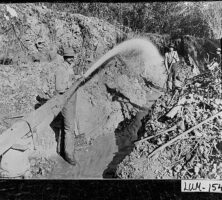Lumpkin County was established by the state legislature in 1832 and named after Georgia governor Wilson Lumpkin, who also served as a U.S. congressman and senator. Lumpkin County and its seat, Dahlonega, are famous as the site of the country’s first major gold rush, which began in 1828.
Gold ore was plentiful enough in the northeast Georgia mountains for construction of a branch of the U.S. Mint, which operated from 1838 to 1861. The mint burned in 1878, and a new building was constructed on its foundations, which today houses the administrative offices of North Georgia College and State University (NGCSU). The Gold Museum traces the history of gold mining in Lumpkin County, and the annual World Open Gold Panning Championship commemorates the metal’s continuing influence on this region. Gold Rush Days in October take thousands of participants back in time, re-creating the history, arts, and crafts of the mid-1800s.
With its pristine air, good water, and beautiful mountain views, the county is a natural oasis for urban residents and tourists. Opportunities for outdoor activities abound, both in the nearby Chattahoochee National Forest and throughout the county. Popular activities include canoeing, tubing down the Chestatee River, motorcycling, and bicycling, which culminates in September’s Six Gap Century and Three Gap Fifty bicycle rides.

Lumpkin County is steeped in history. The U.S. Army Ranger Mountain Training Center is located at Camp Frank D. Merrill. NGCSU, located in the center of Dahlonega, is the military college of Georgia and a liberal arts institution serving the northeast Georgia region. The cadet corps includes a world-famous precision drill team, the Blue Ridge Rifles. The original Blue Ridge Rifles were organized in 1861 as Company E, Phillip’s Legion Infantry–The Blue Ridge Rifles. In 1958 the drill platoon at NGCSU was renamed the Blue Ridge Rifles, in honor of the original unit.

Lumpkin County covers an area of 284 square miles. According to the 2020 U.S. census, the population was 33,488. Long-term county residents, a residential college population, and newly arrived workers along the Highway 400 corridor to Atlanta all call Lumpkin County home.

Dahlonega has an active parks and recreation program with excellent facilities, as well as a new jail. Lumpkin County High School was initially opened in fall 2003, as was a new elementary school. The county’s economic base rests on the service industry, tourism, wine-making industry, and poultry farming.
Its proximity to Atlanta (about sixty miles) allows residents to enjoy international cultural and recreational opportunities while living in a semirural, less hectic environment.









